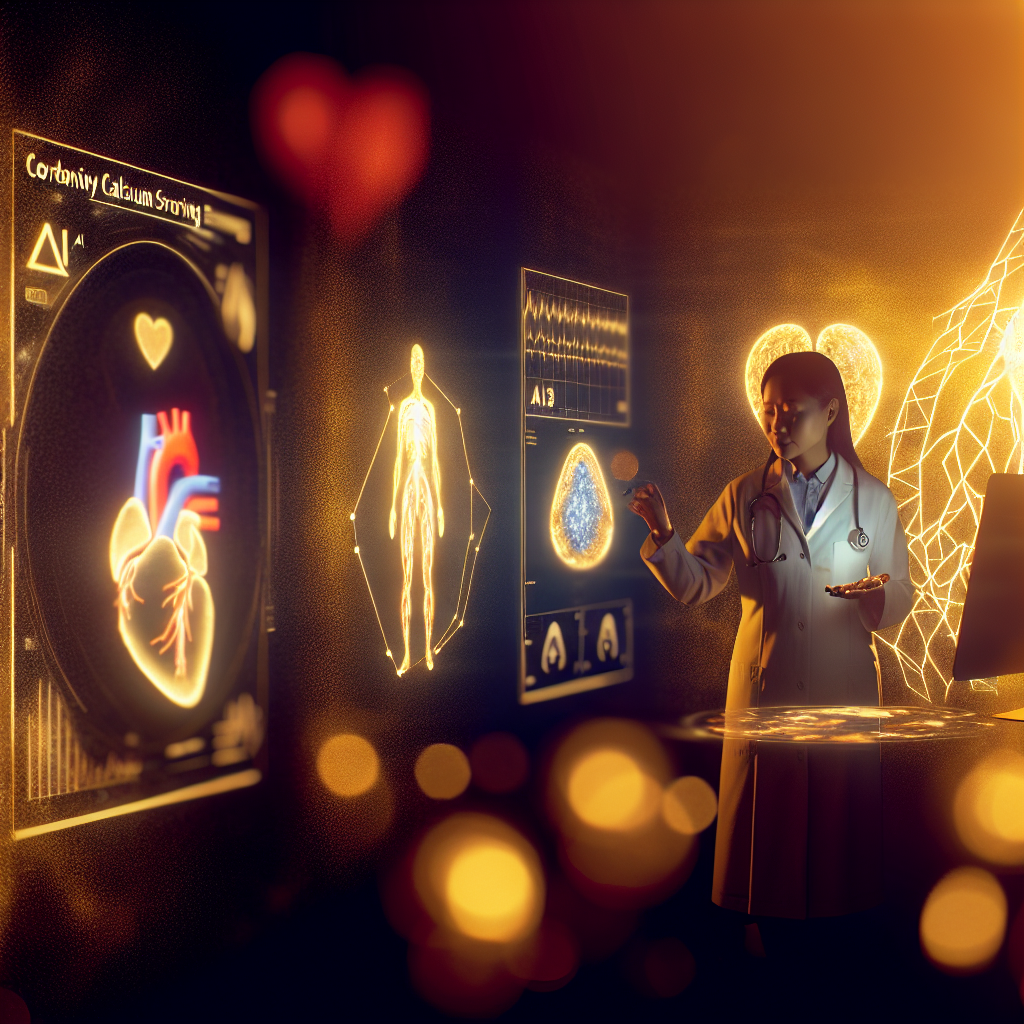
“`HTML
Coronary Calcium Scoring AI: A Breakthrough in Preventive Cardiology
Preventing heart disease has always been one of the greatest challenges in modern medicine. In recent years, Coronary Calcium Scoring AI has emerged as a transformative tool in detecting early signs of heart disease and revolutionizing preventive cardiology. By integrating AI technology with traditional calcium scoring methods, we are now able to predict potential cardiovascular risks with unprecedented accuracy, saving lives and shaping a healthier future.
What is Coronary Calcium Scoring?
Coronary calcium scoring is a non-invasive diagnostic test that uses computed tomography (CT) scans to measure calcium deposits in the coronary arteries. These deposits, or “calcifications,” are indicators of atherosclerosis, a condition where arteries harden due to plaque buildup. Essentially, this score provides a window into a patient’s cardiovascular health and their risk of developing heart disease.
The addition of AI-powered tools to analyze coronary calcium scores has only expanded the potential of this test. Combining medical imaging with machine learning boosts efficiency and precision, allowing physicians to act quickly and craft personalized preventive strategies.
How AI is Enhancing Coronary Calcium Scoring
AI has become a game-changer in analyzing coronary calcium. Here are some of the ways AI technology elevates this process:
- Automation: AI algorithms can automatically detect and measure coronary calcium deposits on CT scans, drastically reducing the time required for manual analysis.
- Increased Accuracy: By minimizing human error, AI ensures more accurate readings of calcium scores, leading to better treatment decisions.
- Early Detection: AI can identify trends and patterns in patient data that may have been missed through traditional techniques, allowing for early intervention.
- Scalability: AI empowers healthcare providers to screen a larger number of patients efficiently, addressing the rising demand for preventive cardiac care.
As AI continues to gain traction in healthcare, incorporating it into clinical workflows is a natural step forward for professionals seeking innovative approaches to saving lives.
Transforming Preventive Cardiology
Why Coronary Calcium Scoring AI Matters for Cardiovascular Health
Heart disease remains the leading cause of death worldwide, making prevention critical. Traditional risk assessments rely heavily on factors like cholesterol levels, blood pressure, and family history to predict cardiovascular disease. Although useful, these indicators can often miss subtle but significant signs of underlying heart conditions.
Coronary Calcium Scoring AI redefines how physicians can assess risk:
- Evidence-Based Risk Stratification: By turning imaging data into actionable insights, AI helps identify high-risk patients who may need immediate intervention or lifestyle changes.
- Guiding Preventive Measures: Personalized recommendations based on AI-enhanced scores empower patients to make informed decisions, such as adopting healthier diets or exercise routines.
- Bridging Gaps in Care: Incorporating AI allows underserved populations to access advanced diagnostic tools, reducing healthcare disparities.
The ability to anticipate cardiovascular problems before symptoms appear ensures more effective and affordable healthcare while improving patient outcomes.
Real-World Applications of Coronary Calcium Scoring AI
Here are some success stories and applications of this groundbreaking technology:
- Primary Care Integration: Family physicians are using AI-based coronary calcium scoring to identify patients who may benefit from cardiologist referrals before complications arise.
- Reducing Emergency Room Visits: Predictive algorithms can help prevent hospital readmissions by identifying patients at risk of heart attacks or strokes.
- Enhanced Clinical Trials: AI reduces variability in data interpretation, providing researchers with clearer results when testing new therapies or interventions.
- Telemedicine: AI-powered remote diagnostics eliminate the need for frequent in-person visits, ensuring seamless preventive care for patients in rural or remote areas.
Challenges and Considerations in AI-Powered Calcium Scoring
Despite its remarkable potential, there are hurdles to widespread adoption:
- Data Privacy and Security: As with any AI application in healthcare, ensuring patient confidentiality and securing massive datasets remains a priority.
- Bias in Algorithms: AI systems may inherit biases present in training datasets, potentially leading to uneven outcomes for certain demographic groups.
- Regulatory Challenges: Navigating the approval processes for AI-based solutions across different regions can delay adoption.
- Cost Considerations: While AI reduces long-term costs, initial investments in technology and training can be prohibitive for smaller facilities.
Addressing these challenges requires collaborative efforts from physicians, tech developers, and policymakers to ensure that Coronary Calcium Scoring AI reaches its full potential.
The Future of Coronary Calcium Scoring AI in Preventive Cardiology
As artificial intelligence continues to evolve, the possibilities for its application in preventive cardiology are limitless. Future advancements may include:
- Real-Time Analysis: Combining wearable devices with imaging-based AI systems could allow for real-time monitoring of cardiovascular health.
- Genetic Integration: Understanding how genetic markers interact with calcium scores could offer even deeper insights into heart disease risk.
- Global Scalability: As technology becomes more accessible, even resource-poor regions may benefit from world-class diagnostic tools.
The integration of AI into coronary calcium scoring isn’t just a technological upgrade; it represents a fundamental shift in how we approach heart disease prevention. As breakthroughs continue, both patients and providers alike stand to benefit from more personalized, efficient, and proactive care.
Conclusion
Coronary Calcium Scoring AI is not just an incremental improvement—it’s a revolution in preventive cardiology. With its ability to deliver swift, accurate, and actionable insights, it empowers providers to make smarter decisions and patients to take control of their heart health like never before.
As adoption grows and challenges are addressed, AI-driven solutions hold the promise to reduce the global burden of cardiovascular disease and create a future where proactive care takes center stage.
“`
